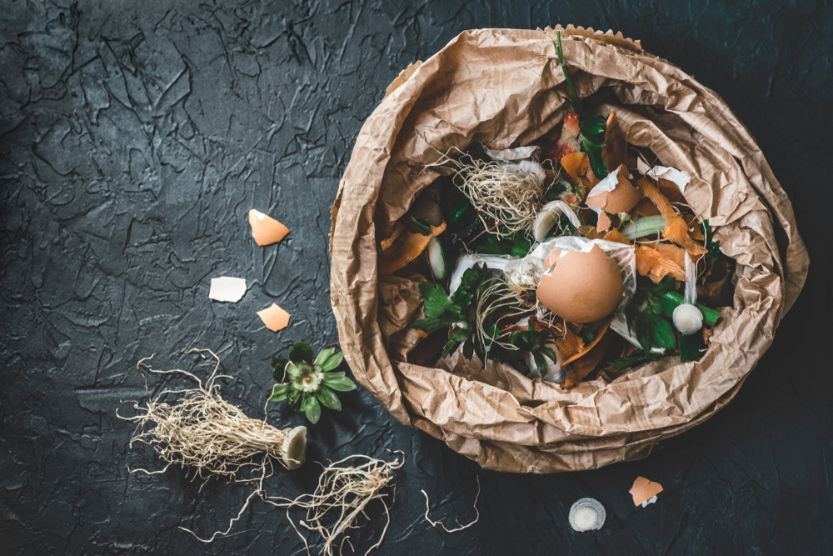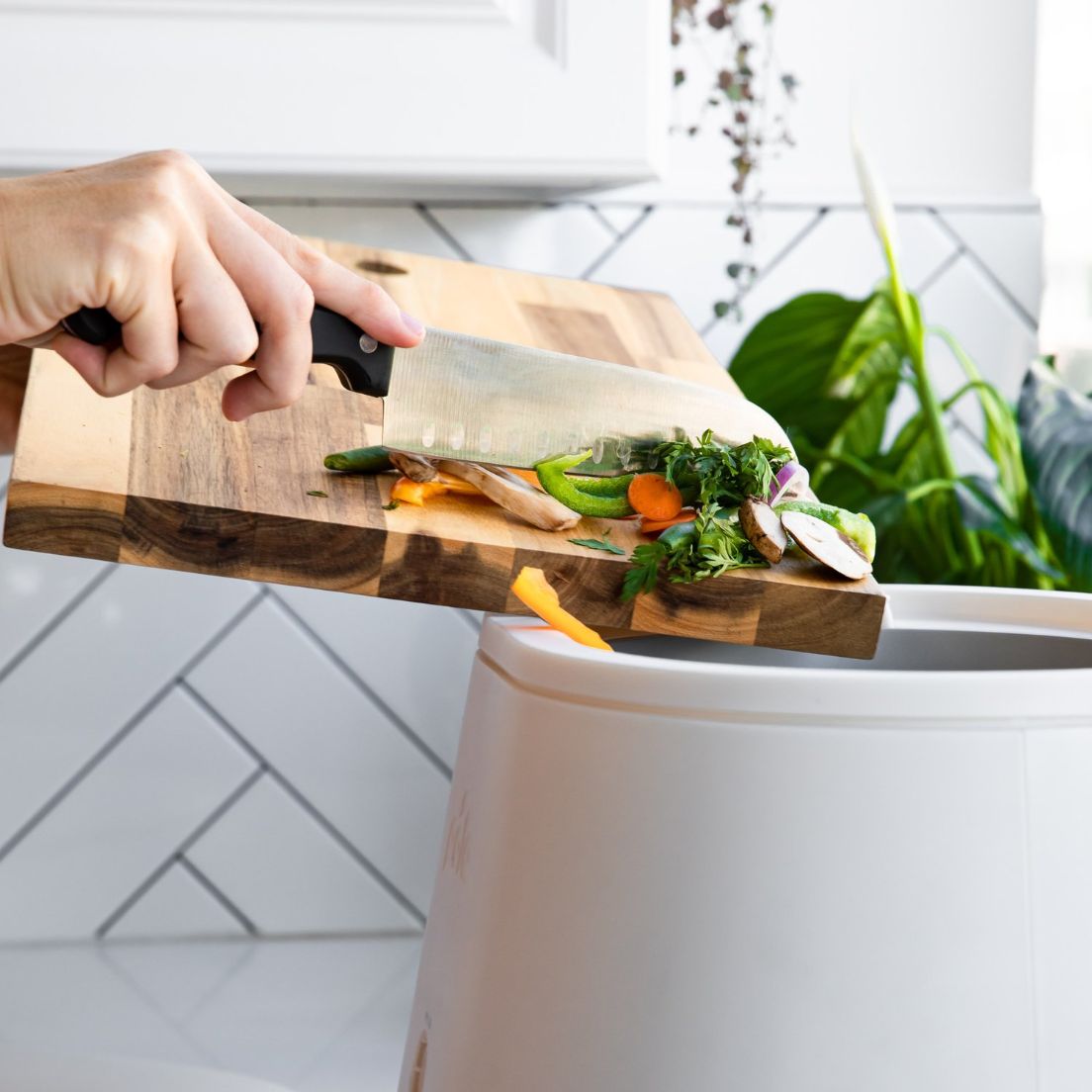
We live in uncertain times with unprecedented challenges in all aspects of society. Many of us are grappling with how we can contribute to positive change. There is a simple action we can all take to create sustainable change and protect our planet: reduce food waste by composting. Composting is a simple and straightforward technique that we can do to help the environment. Through recycling organic materials, from kitchen food scraps to leaves, we can make a positive difference in our communities by reducing waste and helping the environment.
While composting at home has many benefits, it can sometimes get a little smelly. So, if you are wondering “Why does compost smell?” or, more importantly, “How to stop compost smelling?”, you’ve come to the right place! Feel free to jump ahead to the section you are interested in or read the entire article once. Here are some of the topics we’ll cover in this article:
- Does compost smell?
- Top 5 reasons why your compost is smelling
- How to compost without smell: 4 tips to achieve odorless compost
- 5 best odorless kitchen compost bins for your home
- Top 6 FAQs about smelly compost
This article will cover some fun and easy tips about keeping an odor-free kitchen compost bin, speeding up the composting process, and exploring some of the best indoor compost bins with no smell. So, let’s get started and find out why your compost is smelling.
Does compost smell?
Some people are hesitant to have an indoor compost bin because they're worried about how it will smell. But, compost done correctly won't smell bad at all. In fact, healthy compost will emit a pleasant, earthy odor. Smelly compost is a sign that something went wrong, and you need to make adjustments.
If you’re a beginner composter and you’re worried about making mistakes, that’s okay! We’re going to review some amazing indoor composting bins that are odor-free, easy to wash, and even fit on your countertop. A top performer that almost makes garbage a thing of the past and produces healthy, nutrient-rich dirt is the indoor food recycling appliance called Lomi.
We’re also going to let you know why your compost could be smelling bad, and what you can do about it. Your nose and the environment both will thank you as you learn the top tips on how to easily neutralize compost smell, thus creating a more sustainable future in a comfortable and convenient way.
Top 5 reasons why your compost is smelling
As we mentioned, if your compost bin is smelling, then there’s a problem. These are the most common mistakes that can cause bad smells:
- Your compost isn’t getting enough oxygen: Compost piles have a range of natural helpers from worms to aerobic organisms that work to decompose organic waste. These helpers need oxygen to work, so a lack of airflow will prevent your waste from composting.
- You don’t have a good mix of green materials and brown materials: It’s important to have the right balance of nitrogen and carbon in your compost. Too many greens or browns can prevent the compost from decomposing correctly. Check out this article for more details on achieving the best ratio.
- The compost pile is too wet: While it’s important for your compost pile to be damp, it isn’t going to break down into nice, earthy soil if there's excess moisture. You should be aiming for your compost pile to feel like a wrong-out sponge.
- The waste isn’t layered properly: Layering compost isn’t always necessary, but it does break the compost down faster and helps prevent any smells from escaping. While there’s a bit more to it, you generally want a brown layer, followed by green waste, and continuing to layer until you end with a final brown section.
- You added smelly waste: Although pretty much any food can be composted, some food is just going to smell terrible in the process. That includes foods such as animal products, like meat or dairy. Check out this article for more details on what you shouldn’t compost.
How to compost without smell: 4 tips to achieve odorless compost
The best way to avoid smells when composting is to follow a beginner’s guide as closely as you can. However, when you’re just starting out, it’s understandable that you might still be worried it will smell. In that case, we have some tips for you to eliminate or reduce potential smells:
1. Use an electric composter

Electric composters for your kitchen are great modern alternatives to having a large outdoor compost pile. Most electric composters have a similar process of drying, grinding and cooling organic household waste to create healthy dirt.
A food waste recycler is beneficial in three big ways: it’s not going to stink, electric composting is effortless, and it’s much faster than traditional composting. With Lomi, for example, you just fill it with your kitchen scraps, press a button, and receive nutrient-rich dirt in less than a day!
Have limited counter space and are interested in an odorless kitchen compost bin? Another fantastic benefit of food waste recyclers is that they take up just a couple of feet of space, leaving you plenty of room to cook up a storm.
PRO TIP: When looking for a food waste recycler, remember to check the aeration system.

2. Use a compost tumbler

If electric composters aren’t within your budget, compost tumblers are a great second choice. They don’t do all the work for you, and they aren’t as fast, but they certainly make composting much easier.
Compost tumblers are essentially bins with a handle that make it so you can easily rotate the bin. This makes aerating your compost pile a breeze, especially compared to turning it manually. The easy aeration and completely enclosed bin also help to ensure there aren’t going to be any unpleasant smells in your home.
PRO TIP: Compost tumblers are a great choice for both an outdoor and indoor bin. You can keep your tumbler outside during the warmer months, and then bring it back inside during the colder months for an efficient composting process.
3. Have an outdoor pile when possible

If you have the space for a traditional backyard compost pile, that really is a fantastic option when you’re worried about odors. Even if your pile does start stinking, those smells aren’t going to waft around your house and make everyone uncomfortable.
Of course, you still want to monitor how your compost is smelling. If it’s off, figure out what’s wrong and how you can fix it. You still want a successful crumbly compost at the end.
PRO TIP: Outdoor compost piles are always going to be able to accommodate more compost than an indoor bin. If you have a big family or like to garden, consider taking advantage of that to create as much compost as you can.
4. Cover your pile in dry, brown materials

Let’s say you do have an indoor bin, and it does start to smell. Even if you figure out the problem and do what you can to fix it, the smell will still take a bit to go away. You can prevent smells from leaving your bin by piling some brown ingredients on the top, such as shredded newspaper or dry leaves.
PRO TIP: It can help to keep a bag of brown waste right next to your compost bin. You’ll always have that extra waste there whenever you need it without having to go searching for more in a pinch.
5 best odorless kitchen compost bins for your home
If you’ve decided that an indoor compost bin is the way to go for you, that’s great! Here are the best odorless indoor compost bins for you to choose from:
1. Lomi

Image credit: Pela
Capacity: 3L
Type: Electric Food Waste Recycler
Price: $499 | Shop on Pela (with available payment plans)
|
What we like |
What we don’t like |
|
|
2. EPICA Stainless Steel Compost Bin

Capacity: 1.3 gallons
Type: Filter bin
Price: $22 | Shop on Amazon
The EPICA Stainless Steel Compost Bin is a breeze to tidy up and wipe down, and is the perfect size for your kitchen. Another great feature is that it can hold up to a couple of days’ of organic household waste. It’s practically odor-free, as the replaceable activated charcoal filter naturally hides any stinky smells.
|
What we like |
What we don’t like |
|
|
3. Bokashi Bin

Capacity: 5 gallons
Type: Anaerobic bin
Price: $63.95 | Shop on Amazon
Another option is the relatively new Bokashi Bin. All you need to do to get started is to buy a Bokashi bin kit and follow its instructions. All you really need to do is mix all your food waste in the bin with the Bokashi bran and press down on everything in there to get rid of any air pockets. You'll have a finished compost pile after about 2 weeks, but it’s important to note that compost will be too acidic to use in your garden.
|
What we like |
What we don’t like |
|
|
4. Bamboozle Food Compost Bin

Image credit: Bamboozle
Capacity: 1.25 gallons
Type: Filter bin
Price: $50 | Shop on Bamboozle
The Bamboozle Food Compost Bin is the right combination of eco-friendly and safe. From the modern sleek design to the strong and eco-friendly bamboo fiber material, you are sure to tick all the boxes and reduce negative impacts on the environment. The filter ensures odors remain at a minimum, and the biodegradable material of bamboo fibers completely decomposes.
|
What we like |
What we don’t like |
|
|
5. Uncommon Goods' Living Composter

Image credit: Uncommon Goods
Capacity: 7L
Type: Worm composter
Price: $199 | Shop on Uncommon Goods
The Uncommon Goods' Living Composter is an ideal combination of form and function. This gracefully designed compost bin does double duty as a planter and worm farm in an aesthetically pleasing vessel. Place organic waste into the top openings and the worms will get to work. The worms will amazingly eat at least half of their own weight of scraps per day.
|
What we like |
What we don’t like |
|
|
Top 6 FAQs about smelly compost
Careful planning and maintenance of compost bins ensures minimal smell. However, if you discover your compost is a bit stinky, something might be out of balance. You might be wondering - should compost smell like poop? And what are you supposed to do when compost smells like ammonia? Let’s review some FAQs about smelly compost to learn how to turn your eco-friendly composting efforts into a treat for your nose and the earth.
1. Why does my compost smell?
There are a few reasons your compost could be smelling, but it all boils down to a problem with your compost's ecosystem and ability to properly decompose the organic waste. Being too wet or too dry, not having the right mix of greens and browns, and not getting enough oxygen can all cause smelly compost.
As mentioned previously, it’s also possible to have bad smells from specific foods, such as meat and dairy waste. The smells these foods produce can also attract unwanted pests, so it’s important to watch what you’re putting in your compost pile.
2. What should compost smell like?

An odor-free compost bin is the goal. There should be a pleasant earthy fragrance, similar to fresh rainwater on soil. A well-maintained ecosystem in your compost bin is important for this smell. Anything aside from this pleasing, natural smell is a sign that you need to make changes in your compost pile.
3. Why does my compost smell like poop?
If your compost smells like poop, that's a pretty clear sign that you have too much green material in the mix. By green waste, we mean waste that's high in nitrogen, which is generally the wet food scraps you toss out. It's also possible your pile is too wet. Both can be solved by adding extra dry, brown material.
4. What does it mean if my compost smells like ammonia?

Compost smelling like ammonia is another sure sign that there's too much nitrogen in your compost heap. This happens because the excess nitrogen (N) escapes the compost in the form of ammonia (NH3). Once again, the best way to fix this problem is to add more brown material to your compost.
5. How long does it take for compost to stop smelling?
How long it takes for compost to stop smelling depends on what's causing the smell and how easy it is for you to solve the problem. If you solved the problem and the smell is still there, you can always add brown material on top to prevent the smell from wafting into the rest of your home.
6. How can I make compost at home without smell?
The best way to make compost at home without smell is to follow a guide on proper composting. Any well-done compost will smell pleasant. If you're just starting out and you're not confident you'll get it right to start, you can rely on other methods, such as using an electric food waste recycler like Lomi.
If the only reason you haven’t started composting is that you’re worried about the smells, we hope we’ve convinced you it won’t be a problem! Compost generally smells pleasant, but there are great ways to ensure there won’t be any smells at all. One such way is with Lomi, which will easily and swiftly turn your kitchen scraps into wonderful dirt. Check out what people are saying about Lomi to see if it’s right for you!
